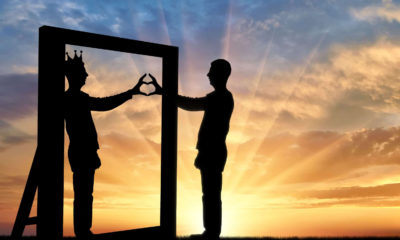
OpEds

No bigger wake-up call than the Chaim Walder debacle
We’re heartbroken and devastated at the state of our community when it comes to sexual abuse, and the Chaim Walder debacle has had a deep impact.
We easily fall prey to making this issue of sexual abuse all about Israel and not us. We have a lot to say about how the religious leadership should be handling these types of cases. While these points may be valid, the danger is that it lets our community off the hook.
Abuse in our community
Hardly a day goes by where there isn’t a call relating to abuse in our community to Koleinu’s helpline. The cases relate to a range of issues from child-on-child sexual abuse, teenager on younger child sexual abuse, date rape, physical violence in our schools against children, domestic violence which includes emotional, verbal, physical, financial and sexual abuse, as well as authority abuse.
We get calls about extra-lesson teachers, doctors, religious leaders, and coaches.
Reluctance to report
In most of these cases, we find ourselves up against an invisible wall in which the victim refuses to report the perpetrator to the authorities. The reasons for this are varied, and we understand the difficulties that victims face when considering reporting the perpetrator.
They have to break through deep shame, humiliation, and fear. At times, it’s just too hard for a victim to take this step. We never judge victims for their decisions, and we never pressurise them.
However, where our frustration lies is in the strongly rooted belief that our police system is useless and ineffective. While we understand the reasons for this thinking, we also know that it’s counterproductive in cases of sexual abuse.
Our community cuts itself off from any recourse to justice, and the perpetrator gets a message that there are no consequences for their crimes.
The South African justice system – friend or foe?
It’s clear from international research, where perpetrators have been interviewed, that the only thing that will deter them is the fear of being caught and severely punished.
And yet, our community has a shocking track record when it comes to reporting perpetrators. Though there have been cases in which Jewish perpetrators have been prosecuted, these are few and far between.
A further frustration lies in the view that sending someone to jail in South Africa is an automatic death sentence. Captain Colin Morris, a retired captain from the family violence, child protection, and sexual investigative unit of the South African Police Services, with more than 30 years of experience, refutes this belief.
He says that while prison obviously isn’t an easy place to be, when it comes to Jewish prisoners, there are many preventative measures to keep them safe. There are kosher food programmes, regular visits with monitoring by a Jewish chaplain, psychosocial services which can be arranged through the Jewish community, and often financial resources provided by the Jewish community to offer competent legal representation.
Our view is that though these measures are helpful, a perpetrator who offends in South Africa has to know that they face jail time if they are found guilty. We believe that possible imprisonment should not be a deterring factor in reporting these criminals.
This is the system we have, and we need to use it if we are ever going to reduce the amount of abuse in our community significantly.
Support services
We understand that the community has very little confidence in regular police services. However, we would like to offer some reassurance that we have access to professional and committed legal professionals within our community. They are in a position to handle these cases extremely effectively and take on pro bono cases where necessary.
One of the lawyers in our community who is passionate about bringing sexual offenders to book had this to say, “We are specialists who assist in guiding and accompanying victims through the process of laying criminal charges against their perpetrators, either where no charges have been brought before or where an inadequate investigation was previously conducted. Using our expertise and support, we ensure that the process is followed correctly from the beginning so that all victims receive the justice and closure they deserve.”
In addition to this, it’s important for victims to know that their identity will be protected and they will remain anonymous. When it comes to children giving evidence, excellent programmes have been developed, such as using therapy dogs to prepare and support them through the court process.
Over and above all this, Koleinu is able to facilitate this process, and work behind the scenes with the victim to ease the way through. At no point will a victim, adult, or child, feel alone.
Further barriers to reporting
Religious barriers which have bearing on the paucity of reporting are the issues of lashon hara and mesira (handing a Jew over to the secular authorities such as the police).
There has been a plethora of instruction coming from rabbinic leadership locally and Internationally that the prohibitions of lashon hara and mesira fall away completely when it comes to protecting the community from a sexual predator. The protection of the vulnerable is an absolute priority in Jewish law.
In fact, failure to report means that any further acts of abuse by that perpetrator on future victims can be attributed to the community’s silence.
In South African law, it’s a criminal offence not to report suspected or actual child abuse, and failure to do so is punishable by serving time in jail. This is the level of seriousness our justice system gives to reporting these crimes. If we fail to protect children and the vulnerable in our community from these heinous acts, who will? Where can they turn?
Koleinu’s message
We approach all victims of abuse with absolute humility and the greatest of admiration. Our hearts bleed for the victims of Chaim Walder, who had the courage to report him but unfortunately, justice was cruelly snatched from them when he committed suicide.
What was lost to the victims was their day in court, their opportunity to look their abuser the eye and hold him accountable. It adds yet another tragic element to their story.
We know, as victims of sexual abuse at the hands of a medical doctor in our community, how immensely difficult it must have been for these women to overcome their resistance and fear and speak out against a man held in such high esteem.
We also know, from our personal experience, how empowering it is to take one’s power back from a perpetrator and hold them to account. There is great meaning and healing to be found on this journey. We hope and pray that the Chaim Walder story will elicit major change in the way that Jewish communities worldwide deal with abuse.
How impactful and comforting would it be for Walder’s victims to know about the positive changes to world Jewry brought about by their suffering and their courage.
Koleinu is about to embark on a campaign to encourage the reporting of abuse. Our aim is to make reporting the norm, not the exception, and in so doing, to ensure the safety of our precious community and make the world of the perpetrator smaller and smaller.
- Rozanne Sack and Rebbetzin Wendy Hendler are the co-founders and directors of Koleinu, the helpline for victims of abuse in the South African Jewish community. The helpline number is 011 264 0341, operating on Monday and Wednesday from 09:00 to 24:00, and Tuesday and Thursday from 07:00 to 22:00.










